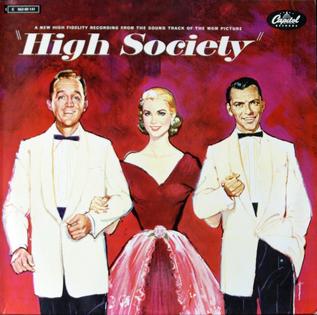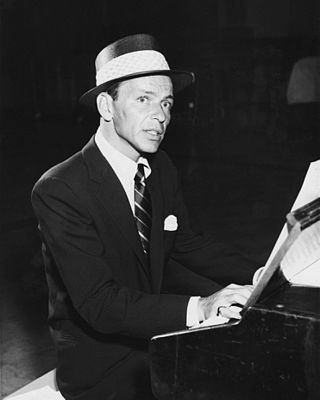
Fredrick Malcolm Waring Sr. was an American musician, bandleader, and radio and television personality, sometimes referred to as "America's Singing Master" and "The Man Who Taught America How to Sing". He was also a promoter, financial backer and eponym of the Waring Blendor, the first modern electric blender on the market.
"Something's Gotta Give" is a popular song with words and music by Johnny Mercer in 1954. It was published in 1955. It was written for and first performed by Fred Astaire in the 1955 musical film Daddy Long Legs, and was nominated for an Academy Award in 1955 as Best Original Song, losing to "Love is a Many Splendored Thing" from the film of the same name.
"In the Cool, Cool, Cool of the Evening" is a popular song with music by Hoagy Carmichael and lyrics by Johnny Mercer. It was originally planned to feature it in a Paramount film written for Betty Hutton that never took off, which was to be called The Mack Sennett Girl. The song was buried in Paramount's files until it was rediscovered and then used in the 1951 film Here Comes the Groom and won the Academy Award for Best Original Song.

A Man and His Music is a 1965 double album by Frank Sinatra. It provides a brief retrospective of Sinatra's musical career. The album won the 1967 Grammy Award for Album of the Year.
"Prisoner of Love" is a 1931 popular song, with music by Russ Columbo and Clarence Gaskill and lyrics by Leo Robin.
"All the Way" is a song published in 1957 by Maraville Music Corporation. The music was written by Jimmy Van Heusen with lyrics by Sammy Cahn.

"The Way You Look To-night" is a song from the film Swing Time that was performed by Fred Astaire and composed by Jerome Kern with lyrics written by Dorothy Fields. It won the Academy Award for Best Original Song in 1936. Fields remarked, "The first time Jerry played that melody for me I went out and started to cry. The release absolutely killed me. I couldn't stop, it was so beautiful."
"But Not for Me" is a popular song originally written by George Gershwin and Ira Gershwin for the musical Girl Crazy (1930).
"Hello, Young Lovers" is a show tune from the 1951 Rodgers and Hammerstein musical, The King and I. It is sung by Anna, played by Gertrude Lawrence in the original Broadway production; by Valerie Hobson in the original London West End production; and by Deborah Kerr in the film version.

High Society is a 1956 soundtrack album, featuring Bing Crosby, Frank Sinatra, Louis Armstrong and Grace Kelly. This was Crosby's fifth LP album, and his first recorded for Capitol Records. It was the soundtrack for the MGM feature film High Society, also released in 1956. Initially issued on vinyl either in mono or stereo format, the album has been issued on CD by Capitol in Japan in 1991 and by Capitol in the UK in 1995. The album was also included in a 3-CD box set called "Original Soundtrack Recordings" issued by the EMI Music Group Australasia

Bing Sings Whilst Bregman Swings was Bing Crosby's sixth LP, his first album for Verve, recorded and released in a mono format in 1956.

Frank Sinatra's musical career began in the swing era in 1935, and ended in 1995, although he did briefly retire in 1971, before returning to music in 1973. Sinatra is one of the most influential music artists of the 20th century, and has sold 150 million records worldwide, making him one of the best-selling music artists of all-time. Rock critic Robert Christgau called Sinatra "the greatest singer of the 20th century". In addition to his music career, Sinatra was also a successful film actor, having won the Academy Award for Best Supporting Actor for his role as Private Angelo Maggio in From Here to Eternity (1953).

Nothing but the Best is a 2008 compilation album by American singer Frank Sinatra. All the tracks on this album are recordings made when Sinatra was on his own Reprise label, thus the first track, "Come Fly with Me" is not the 1957 Capitol version. Other notable differences are "Strangers in the Night" has an extended fade out and the first cymbal hit is cut from the beginning of the "Theme from New York, New York".

Robin and the 7 Hoods is a 1964 12" vinyl LP album originally issued by Reprise as No. F-2021. Wrongly assumed to be a true soundtrack album of the film Robin and the 7 Hoods, it was advertised as "Original score from the motion picture musical comedy" which is correct. The film was made in November/December 1963 and the album was subsequently recorded at United Recording, Hollywood, in April 1964. The scene with Frank Sinatra's vocal of "I Like to Lead When I Dance" was dropped, so only the background instrumental can be heard in the film.

The Frank Sinatra Christmas Collection is a 2004 Christmas compilation album from Frank Sinatra. The selection of tracks on the album spans Sinatra's career from 1957 to 1991 and includes four previously unavailable tracks—two previously unissued on CD and two previously unissued in any format—the latter the last Christmas carol Sinatra recorded.

12 Songs of Christmas is a 1964 album of Christmas music by Frank Sinatra, Bing Crosby, and Fred Waring's Pennsylvanians. The singers previously collaborated on the album America, I Hear You Singing, which was released earlier the same year. The album was reissued as White Christmas on by WEA budget label Midi in 1973.
"The Second Time Around" is a song with words by Sammy Cahn and music by Jimmy Van Heusen. It was introduced in the 1960 film High Time, sung by Bing Crosby with Henry Mancini conducting his orchestra, and was nominated for the Academy Award for Best Original Song. It lost out to "Never on Sunday".

"This Love of Mine" is a popular American song that was first recorded in 1941 by Tommy Dorsey and His orchestra, with a vocal by Frank Sinatra. Sinatra wrote the words and Sol Parker and Hank Sanicola wrote the music.
This is a list of Bing Crosby songs he recorded twice or more during his career, excluding all of the 1954 re-recordings for Bing: A Musical Autobiography.

After Bing Crosby's long-term Decca Records contract was up, he signed many short-term contracts with a wide variety of labels. These included many popular labels such as Reprise, RCA, Verve, Decca (again), United Artists, Capitol and more.












